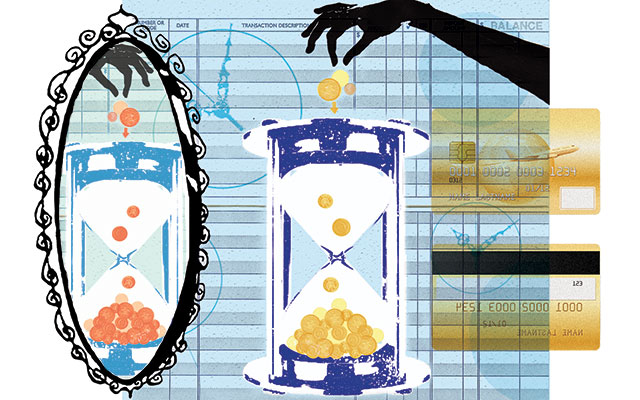Money is a powerful resource. We strive to acquire it. We’re told we cannot survive without it. It buys experiences and objects of desire. No matter how nonmaterialistic we may attempt (or claim) to be, in the end, much of our lives revolve around making money and spending it. Certainly, we expend tremendous mental and emotional energy thinking about it.
But money is also a mirror. Our relationship with it tells us what we value, as well as what we believe — about ourselves and about how the world operates.
This “money mirror” has two sides. The first reflects a fairly clear and concrete image: A careful review of your financial statements can quickly illuminate where the majority of your money (and by extension, your energy) is being expended and withheld. This, in turn, can tell you a lot about your priorities and where certain components of your life may be out of whack.
The second side of the mirror is similar, but a bit more conceptual and complex. It involves applying a checkbook metaphor to the distribution of your time, activities, and life energy. This can show you what kind of value you place on yourself — your focus, attention, and skills.
A review of this metaphorical, energetic checkbook register can help identify areas where you are investing yourself successfully, as well as places you may be “spending” yourself unwisely.
This view can reveal beliefs, relationships, activities, and priorities that may be creating energetic “overdrafts” and sinking you into energetic debt.
We’ll examine both concepts.
Investigate Your Expenses
A hard, cold look at how and where we spend our money can show us whether what we say and what we do are really aligned.
Sit down with your bank and credit-card statements, and look at them as an objective outsider. Imagine you are trying to piece together an image of this “mystery person” based on his or her expenses and buying habits.
What do the purchases and expenses say about this person? What values, priorities, desires, and disconnects does each line item represent?
Consider not just objects and expenses (clothes, food, shelter), but the quality, nature, and possible meaning of those objects and expenses. Are the clothes pricey designer items, or specials bought several at a time? How many of the food purchases are fast food and snacks? How many are organic groceries? Do the mortgage and car payments seem in proportion to this person’s income? How much investment is this person making in personal health and well-being?
Initially, you just want to gaze upon the surface of this spending mirror and see the story as a stranger or private investigator might: What kind of person is this, and what life choices is he or she making? Are there places she spends a lot of money, or places he spends virtually none?
Now look deeper into this side of the mirror. This time, access your personal, intimate knowledge of your expenses, and characterize them according to their deeper meaning:
- Ask yourself some tough questions. Why do you spend money the way you do? Where was your head when you made these purchases? How do you feel about them now? How much money is spent in the service of your own highest choices, and how much is spent because “you’re expected” to have or do certain things?
- Look for disconnects and derailments. How much of your income goes to “time-saving” services and conveniences? How much is being spent as compensation or substitution for some bigger life wish or goal you’re not fulfilling? How much is consolation or “reward” for work, relationship, and life choices that are not very satisfying? If your account activity reveals a lot of purchases made for the sake of superficial satisfaction, distraction, or anesthesia, take note.
- Look for discrepancies. Can you find any areas where your purchases seem self-sabotaging or contradictory? For example, are you buying supplements and wellness products but also eating a lot of fast food and buying virtually no healthy groceries? Do your expenses reveal attention to your body (beauty treatments, clothing), but relatively little to your mind (books, seminars, continuing education)?
Find the Energy Robbers
OK, now it’s time to flip the mirror — the one that often reveals an even deeper part of us.
To see into this side of the mirror, superimpose a mental checkbook register on your daily life. Instead of tracking purchases, create line-item entries (in the form of debits and deposits) that correspond to your daily activities, choices, and energy expenditures.
Once you create this register, you’ll begin to see very clearly where you’re spending your energy and what it’s worth, which can reveal a great deal about your priorities and beliefs. This process requires self-probing honesty and a little imagination.
- Step 1: Track what you do each day. Write down as many mental and physical activities as you can, cataloging all the things you do from the moment you rise to the time you fall asleep.
- Step 2: Determine the cost of each activity. Does it light you up or wear you down? Assign each activity a plus or minus, using your body’s built-in biofeedback mechanism to gauge each event’s barometer of energetic intensity or “value.”
As you jot activities down, notice if they are energizing to you. Be honest! It may seem like talking on the phone is energizing, but if you are complaining the whole time (or listening to someone complain), how energizing is that? If you are putting off an important project by binge-watching Netflix, how energizing is that? Keep in mind that you may need to discern why you are doing something (guilt, obligation, avoidance, approval) in order to get a full disclosure of its actual energetic cost. - Step 3: Set an hourly rate for your time. You can base it on your actual salary, your own sense of what your time is worth, or just an amount that seems right.
- Step 4: Pick a day and figure out what your activities cost or pay you in dollars and cents. For example, an hour of yoga deposits $50 in your energy account, but something de-energizing like playing mindless Facebook games may cost you $25. Commit to tracking all your activities and their costs.
- Step 5: Balance your energetic checkbook at the end of the day. You may be surprised to see how closely connected your monetary and energetic checkbooks are once you calculate your end value. Repeat this exercise as often as you find helpful.
Very often, people who are energetically overdrawn are also spread too thin financially. This happens when we try to compensate for too much stress and too little energy by buying expensive services and products that comfort us, distract us, or help us cope.
In some cases, it may also be because we are unconsciously setting ourselves up for a financial crisis that will force us to change our way of life — perhaps giving up a “lifestyle” that really doesn’t serve us or make us happy in a deep way.
Then again, it may be that we are simply unconscious about where all our different kinds of energy are going.
Whatever the case, if you suspect your monetary and emotional financial statements have a message for you (as they almost always do), take a closer look at them and spend some time going over their numbers. Page by page, you’ll see a clearer, deeper, and more accurate picture of yourself emerging from between the lines.
Balancing Your Energetic Checkbook
If you’ve been exhausted and bouncing a lot of energetic checks lately, the following tips may help you rebalance your bottom line.
- Before you commit to doing something, imagine yourself doing it. Does it energize you? If not, why not? If it doesn’t energize you, why are you doing it?
- Make a list of your relationships. For each one, spend a few minutes thinking and feeling the substance of it. Is it a relationship that is earning interest or costing energy? Remember that relationships have natural endings like everything else. Is it time to let any of them end?
- List all the things you do that make you dislike yourself. List all the things you do that make you feel proud of yourself. What is the percentage of each that you see in your monthly checkbook? Even if you can’t quit doing everything in list No. 1 start doing more of the things from list No. 2, and you’ll see your energy earnings grow.
- Before you purchase another thing, consider the maintenance “costs” that this thing will bring with it. How much time and space will it take up? Will maintaining the object energize you or cost you?
- How much are you spending (figuratively and literally) in storage fees, both in and outside your home? If something takes up room, it also sucks up energy. Take a note pad and go through your house. Look through and really see everything in your closets and drawers. How much of it do you actually use and enjoy? If you are not enjoying it regularly, it is costing you: Pass it on.
- Remember, empty space and open time are necessary for manifesting new things. If you are totally filled up (again, literally and figuratively) there will be no room for new dreams, energies and desires to come in.
Image Is Every “Thing”
We live in a culture that tells us repeatedly that if we can change ourselves externally, we will be happier. This leads us to focus excessively on 1) how we look; and 2) the accumulation of “things.”
In many ways, these two considerations work in tandem. For example, if I’m feeling dissatisfied with my body or appearance, I may make a trip to the beauty parlor and spend several hundred dollars on beauty products. Or, if I feel frustrated about gaining a little weight, I might buy a new dress that I hope will help me feel sexy. If I’m just generally bummed out, I can always go shopping for something that will make me happy (men are famously prone to buying fast cars and motorcycles when insecurity sneaks up on them).
Of course, none of this will change the core reasons for my unhappiness, and no matter how many sexy lipsticks, low-cut dresses and fast cars I own, I won’t feel sexy if I don’t care for and love my body/self/life in a deeper way.
The belief that we can buy our way out of unhappiness and anxiety creates a vicious circle: When we buy things, we have to pay for them. If our spending gets us into debt or financial stress, it further damages our self-esteem. As long as we believe that buying and having lots of things will translate to feelings of safety, power and happiness, we are setting ourselves up for misery.
An even more insidious belief is that money can buy acceptance. It’s not at all unusual for people to expend a huge percentage of their resources in an effort to impress others, or to create experiences that will help others think well of them. Generosity is a fine value, but if it comes at the expense of one’s own financial stability, or it becomes a tool for buying and manipulating other people’s affections and admiration, that “generosity” is probably not coming from the right place (i.e., the joyful, spontaneous desire to share from a place of abundance). And if it’s not, it’s begging to be examined.
In Search of Satisfaction
We purchase and own things because we have a desire for their company. Our desire is what leads us toward our joy, and joy is achieved when we are truly satisfied with our choices and can celebrate them without reservation. The expression of our joy and gratitude helps us evolve, and also leads us to spontaneously share our happiness with others.
When we compromise our desires (because we decide we can’t afford them, don’t deserve them or because we think it might create trouble or invite others’ judgment if we got them) we can never be satisfied. When we don’t experience satisfaction, we cannot get to joy. We never feel we have enough – much less enough to share with anyone else. Our life energy is diminished. And still, the desire persists.
Often, our unmet hunger goes unconscious, and leads us to accumulate all sorts of substitutions, pale imitations and “consolation” prizes. But these never really do the trick. This is the meaning of that old saying: “You can get what’s second best, but it’s hard to get enough.”
When we compromise, bury or sell out our true desires, we tend to acquire more and more “substitute” things in an effort to achieve satisfaction. But acquiring more and more things requires money, energy, space and maintenance. One day you may find yourself exhausted by the never-ending task of cleaning, dusting and organizing a houseful of things that you never really desired in the first place.
If you compromise on something you want because you don’t believe you can afford it, and take the second-best thing instead, you will never achieve satisfaction. Holding out for the best thing, on the other hand, accomplished two objectives: First, it sends a message to your subconscious that you deserve to have what you desire; second, because it does demand a significant investment, and may require you to harness a great deal of energy to achieve, you will have to be fully committed to purchasing it. This helps ensure that the purchase represents your highest choice. (If you are just buying something as a “quick fix” to feel better, you will probably not be willing to spend an entire month’s salary on it).
Once you have the thing you really want, the joy you receive from being in its presence each day will quickly translate into deposits in your energetic checkbook.
This article originally appeared as “The Mirrors of Your Spending” in the July/August 2015 issue of Experience Life.
Insight
If you found this article enjoyable and thought-provoking, we invite you to explore our Insight department for a deeper dive into life-enriching articles on wisdom and introspection.




This Post Has 0 Comments